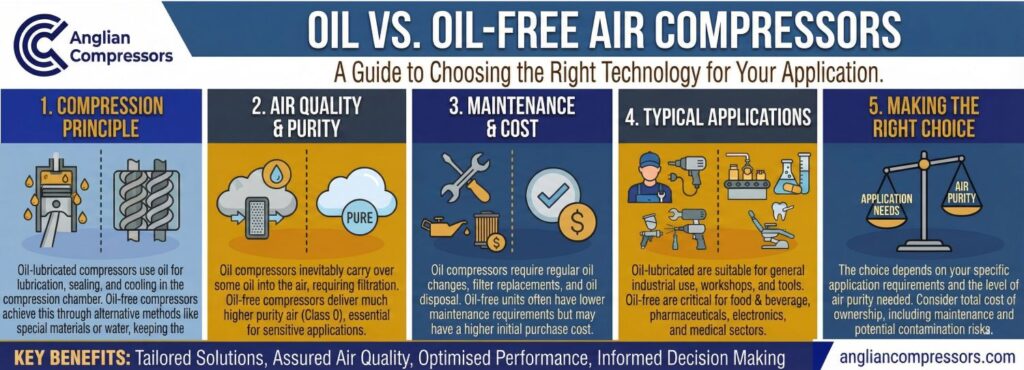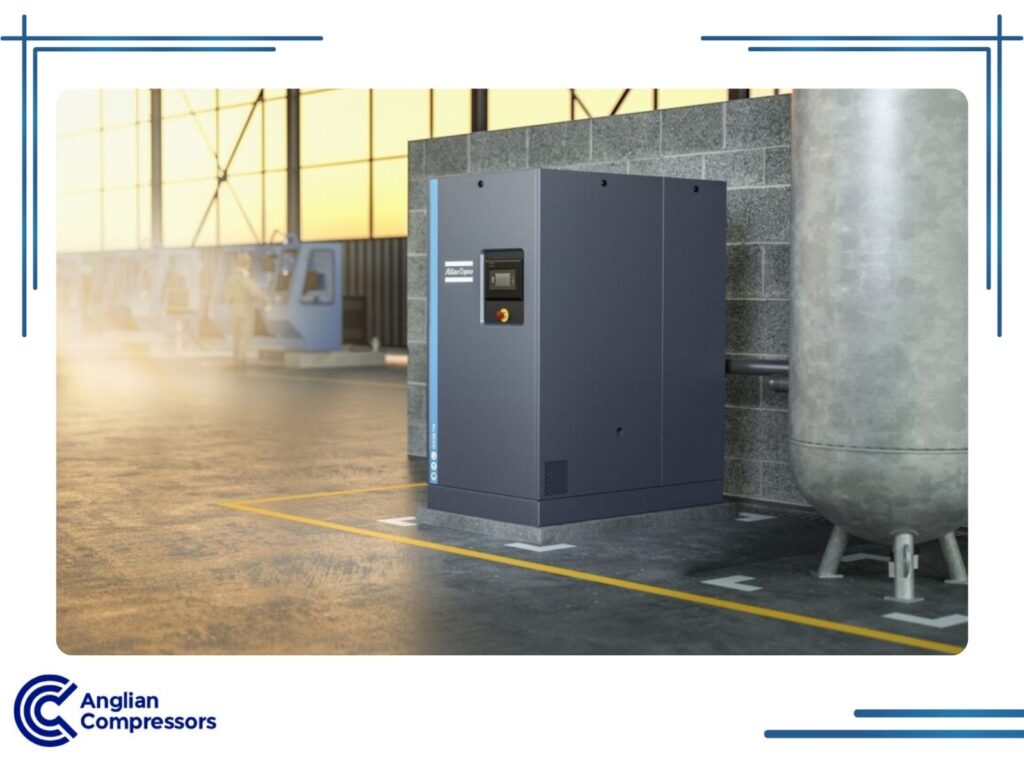Oil vs Oil-Free Air Compressors: The Ultimate Guide
Air compressors are essential across industries, powering everything from tools to production lines. A key decision when choosing an air compressor is whether to opt for an oil free or oil lubricated model.
Oil-free air compressors are lighter, require less maintenance, and eliminate the risk of oil contamination, making them ideal for industries such as food, electronics, and pharmaceuticals. In contrast, oil lubricated compressors such as rotary screw air compressors use oil to lubricate moving parts and offer greater durability for heavy duty applications.
Beyond the basic need for oil, factors like air purity, compressed air system efficiency, and maintenance requirements all influence the right choice. Understanding the differences between oil and oil free compressors, including cost of ownership, air filter management, and environmental impact, will help you select the best solution for your business.
In this guide, we will break down what matters most when deciding between an oil free or oil lubricated compressor.
The Basics: How Air Compressors Work
Several air compressor variations function on a simple principle: they compress air and then use it to power a wide array of tools and equipment. The pivotal role of lubrication in these machines is to reduce friction between moving parts, thereby decreasing wear and tear and preventing overheating. Compressors may also integrate advanced cooling systems or variable speed drives (VSDs) to optimise efficiency, particularly in high-demand environments.

Oil-Lubricated Air Compressors
Oil-lubricated air compressors use oil for lubrication and cooling.
These machines work by pulling in ambient air and compressing it within a confined space. The oil, typically housed in a sump, is precisely injected into the compressor at key friction points. This lubrication helps reduce wear and tear and dissipate heat produced in the compression chamber during the process.
For example, an Atlas Copco GA 37 VSD oil-lubricated air compressor uses a rotary screw mechanism. Its screws, revolving at speeds up to 3000 rpm, encounter immense friction, so lubricating oil is essential. The compressor’s inbuilt oil filters ensure minimal air contamination in the compressed air stream, retaining oil purity as low as 3 ppm.
Additionally, these compressors can be equipped with energy recovery systems that convert waste heat into usable energy, further enhancing efficiency.
Oil lubricated air compressors like the Atlas Copco GA 37 VSD, with a maximum working pressure of 13 bar (188 psi) and a motor size of 37 kW (50 hp), are designed to withstand demanding industrial applications, a testament to the resilience and performance of oil-lubricated air compressors.
The Advantages of Oil-Lubricated Air Compressors
- Heavy-duty performance: With their robust build and high-capacity motors, oil-lubricated air compressor variations, like the Atlas Copco GA series, can efficiently handle high-pressure industrial applications.
- Longevity: If maintained regularly, oil-lubricated compressors tend to have a longer lifespan, ensuring a good return on investment.
- Cooler operation: The oil in these compressors facilitates cooling and lubrication, minimising the risk of overheating during prolonged usage.
The Disadvantages of Oil-Lubricated Air Compressors
- Maintenance requirements: Oil-lubricated compressors generally require regular oil changes, filter replacements, and overall maintenance to ensure optimal performance.
- Risk of oil contamination: Oil may contaminate the compressed air if the oil separator fails or is not maintained correctly, which can be detrimental to some applications.
- Limited portability: Due to their size and weight, oil-lubricated compressors are not easily portable, which could pose challenges in situations where mobility is a factor.
However, recent designs have introduced compact models, improving portability in specific cases.
Oil-Free Air Compressors
Oil-free air compressors, such as Atlas Copco’s ZT 15-22, ZR/ZT 30-45, and ZR/ZT 22-37-55 VSD models, deliver clean compressed air without the need for oil to lubricate internal components. Instead of relying on oil, they use Teflon coatings, water, or advanced self-lubricating materials to minimise friction and extend service life.
These compressors operate through a multi-stage compression process, cooling the air between stages to improve efficiency and reduce the risk of overheating. Without the need to change the oil or maintain oil-water separators, oil-free compressors are better suited for industries like food production, pharmaceuticals, and electronics, where air purity is critical.
Oil-free air compressors are lighter, require less maintenance, and help reduce oil contamination risks in compressed air systems. Many models are ISO 8573-1 Class Zero certified, ensuring they meet the highest air quality standards.
Thanks to recent innovations, modern oil free compressors operate more quietly and last longer than older designs. Features like water injection cooling and advanced air filter technology make a real difference in daily operation.
Whether you are choosing an air compressor for clean room production or portable site work, the range of oil free options available today offers excellent reliability without compromising performance.
The Advantages of Oil-Free Air Compressors
- Low Maintenance: With no oil to change, oil-free compressors, like Atlas Copco’s ZR/ZT series, require less routine maintenance, saving time and costs.
- Air Purity: These compressors eliminate the risk of oil contamination, making them ideal for industries like pharmaceuticals, food processing, and electronics, where air purity is critical.
- Portability: Models like Atlas Copco’s ZT 15-22, ZR/ZT 30-45, and ZR/ZT 22-37-55 VSD are lighter and more compact, offering greater mobility than oil-lubricated compressors.
The Disadvantages of Oil-Free Air Compressors
- Lifespan: Oil-free compressors generally have a shorter lifespan due to increased wear and tear from technically oil-free operations.
- Limited Capacity: Although oil-free compressors can handle a wide range of applications, they may not be suitable for some heavy-duty industrial tasks due to their lower capacity for repetitive tasks.
- Noise Levels: The lack of oil can lead to louder operation, which might be a concern in some operating environments.
However, advancements in noise-dampening technologies have reduced this gap significantly.
Oil vs. Oil-Free Compressors: The Air Quality Factor
Choosing between an oil-lubricated and an oil-free compressor isn’t just about power and performance; it directly impacts the quality of the air your system produces. This is a critical consideration, especially for industries with stringent purity requirements.
Oil-lubricated compressors, while robust and often more cost-effective upfront, carry the inherent risk of introducing oil aerosols into the compressed air stream. Even with efficient oil separators, trace amounts of oil can pass through, impacting product quality, damaging sensitive equipment, or posing health risks in applications where air comes into contact with products or people.
Oil-free compressors, as the name suggests, completely eliminate this risk. By using alternative lubrication methods (such as Teflon coatings or water), these compressors guarantee oil-free air, making them the preferred choice for:
- Pharmaceuticals: Where even minute traces of oil can compromise the integrity of medicines.
- Food and Beverage Production: To ensure compliance with strict hygiene standards and prevent product contamination.
Added insight: The inclusion of high-efficiency filtration systems in modern oil-lubricated compressors mitigates contamination risks, but they still do not match the absolute purity offered by oil-free systems.
Electronics Manufacturing: Where oil contamination can damage delicate electronic components.
Testing Methods for Compressor Air Quality
Ensuring compressed air purity is essential, particularly when choosing between oil-free and oil-lubricated air compressors. Various testing methods help maintain compliance with air purity standards:
- Dew Point Monitoring: For both oil-free and oil-lubricated air compressors, dew point sensors track moisture levels to prevent condensation, corrosion, and microbial growth. These sensors ensure the air supply meets industry standards.
- Particle Counters: Whether using oil-free or oil-injected air compressors, particle counters monitor airborne contaminants. This is particularly important in industries such as food processing, where maintaining air purity standards is critical.
- Oil Vapour Analysis: Oil vapour analysers detect hydrocarbons, helping identify air contamination in oil-lubricated compressors. For oil-free air compressors, this test verifies that the air remains clean and uncontaminated.
- VOC Detectors: Detecting volatile organic compounds (VOCs) ensures air quality in both oil-free and oil-lubricated compressors, helping businesses avoid contamination in sensitive environments.
Incorporating these testing methods ensures that compressed air solutions—whether oil-free or oil-lubricated—meet high air purity standards for any application.
Improving Air Quality in Oil-Free and Oil-Lubricated Compressors
Maintaining clean air in both oil-free and oil-lubricated air compressors is essential for optimal performance. Here’s how to enhance air quality:
- Aftercoolers: These systems cool compressed air, causing moisture to condense and separate. This is particularly important in oil-lubricated compressors to prevent mixing with oil and forming harmful byproducts.
- Dryers: Whether using oil-free or oil-lubricated compressors, incorporating refrigerant or desiccant dryers removes moisture from the air, ensuring a compressed air solution suitable for sensitive applications.
- Filtration Systems: Multi-stage filters capture solid particles and oil aerosols, which is crucial for oil-lubricated compressors. Regularly replacing filters and using oil-water separators helps maintain air quality and meet industry standards.
- Condensate Management: Automatic condensate drains are essential for removing water from aftercoolers, dryers, and air receivers, minimising the risk of corrosion and prolonging the lifespan of both oil-free and oil-lubricated compressors.
- Routine Maintenance: For oil-lubricated compressors, regular oil changes prevent contamination, while oil-free compressors benefit from periodic checks of self-lubricating components like Teflon coatings. Both types require consistent upkeep to sustain air quality.
Myths and Misconceptions
Contrary to popular belief, oil-free compressors are not necessarily much louder than their oil lubricated counterparts. Similarly, it is a misconception that oil-lubricated compressors are universally more durable. The durability of a compressor largely depends on their operating conditions, including the environment, and maintenance practices.

How to Choose Between Oil and Oil-Free
The decision between oil and oil-free compressors hinges on factors such as the intended application, industry requirements, and maintenance capabilities.
Consider the following typical use cases of Atlas Copco compressors:
Pharmaceutical Industry
In this sector, air purity is paramount to avoid contamination of medicines. An oil-free compressor such as Atlas Copco’s ZR/ZT series, which ensures oil-free compressed air, would be the ideal choice.
Food and Beverage Industry
Like pharmaceuticals, air purity is critical in food processing to maintain hygiene standards. Oil-free options, like the ZT 15-22, ZR/ZT 30-45 and the ZR/ZT 22-37-55 VSD, are suitable as they provide clean, uncontaminated air.
Heavy-Duty Manufacturing
In industries where high pressure and constant use are the norm, the resilience and power of oil-flooded air compressors, like the Atlas Copco GA 5-37 VSD, make them a solid choice.
Automotive Industry
Here, both types of air compressor can be beneficial. Oil-free compressors can be used in the painting process to prevent oil contamination, whereas oiled air compressors could be used in power-heavy tasks.
Construction Sites
Portability is a concern in this case and an oil-free compressor, being lighter and more compact, would be the preferred choice for easier transportation.
Ensure you take into account factors like the degree of air quality required, intensity of use, portability needs, and maintenance capabilities before making your choice.
And don’t overlook space limitations. Most users typically place air compressors as close to their points of application as possible because it eliminates the need for long air hoses, which can significantly reduce energy efficiency.
Final Thoughts
In conclusion, when choosing between oil and oil-free air compressors, weigh up their pros and cons. Consider your specific requirements and find the perfect fit for your needs. Whether it’s the efficiency and durability of Atlas Copco oil compressors or the cleanliness and convenience of oil-free compressors, make an informed decision for the best results!
Contact the team at Anglian Compressors, a Branch of Atlas Copco Compressors, for expert advice and help when investing in new compressed air equipment.
FAQ
What are the key differences between oil and oil free air compressors?
Oil free air compressors eliminate the need for oil to keep internal parts moving, whereas oil lubricated compressors use oil to reduce friction and heat. Oil free models are lighter, require less maintenance, and are better suited for applications where air purity matters. Oil injected compressors tend to offer higher durability for heavy duty use but require regular oil changes and more frequent servicing.
Are oil free compressors better for certain industries?
Oil free compressors are better for industries where clean air is essential, such as pharmaceuticals, food processing, and electronics. A range of oil free options, including oil less air compressors and rotary screw designs, ensures that businesses can choose an air compressor that provides high purity without risking contamination from oil.
Do oil lubricated air compressors require more maintenance?
Yes, air compressors that are oil lubricated generally require more maintenance because they need regular oil changes, oil filter replacements, and monitoring of oil water separators. In comparison, oil free compressors are designed to operate with fewer maintenance demands, making them more convenient for environments where downtime must be kept to a minimum.

